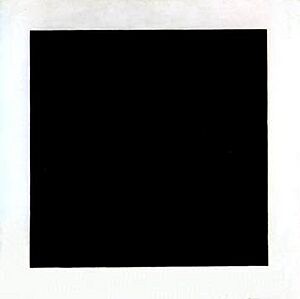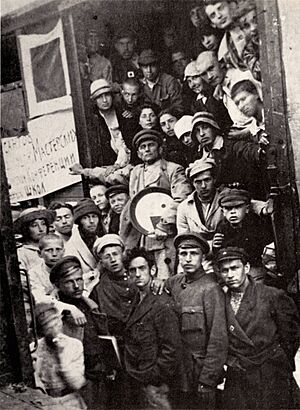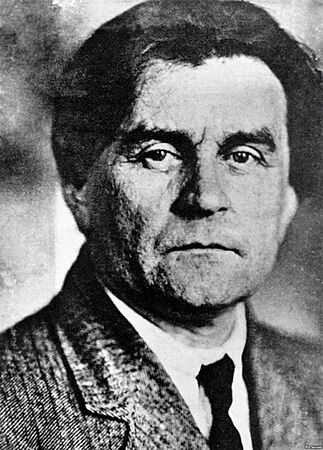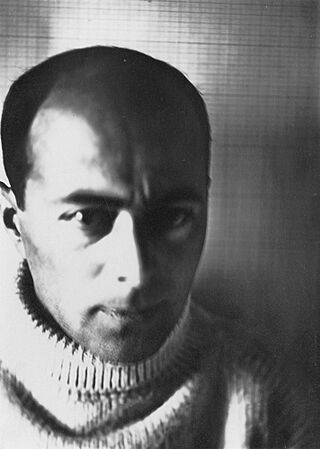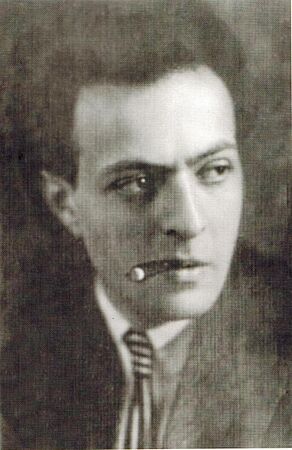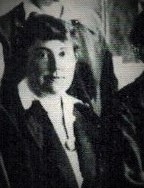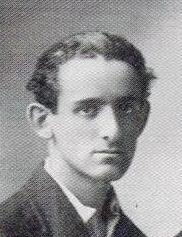UNOVIS facts for kids
UNOVIS was a special group of artists in Russia. It was started in 1919 by a famous painter named Kazimir Malevich. The group was based at the Vitebsk Art School.
UNOVIS was only active for a few years, but it had a big impact on art. The artists in the group wanted to create new ideas and styles. They especially focused on Malevich's ideas called Suprematism. This was a new way of making art using simple shapes and colors.
The group made many art projects and books. Their ideas quickly spread across Russia and other countries. UNOVIS stopped working together in 1922.
The name UNOVIS is a short form of a Russian phrase. It means "The Champions of the New Art." Before UNOVIS, the group had other names. It was first called MOLPOSNOVIS, which meant "Young Followers of the New Art." Later, it was called POSNOVIS, meaning "Followers of the New Art."
Contents
How UNOVIS Started and Grew
UNOVIS changed a lot in its short history. It began as MOLPOSNOVIS with students. Soon, some teachers from the art school joined. The group then became known as POSNOVIS.
The artists were very busy. They worked on many projects and tried new things. They used all kinds of art forms available at the time. In 1919, Malevich was asked to teach at the Vitebsk Art School. He quickly became the head of a teaching studio there.
In February 1920, Malevich led the group in creating a "Suprematist ballet." This was a dance performance based on Suprematist art ideas. After this, POSNOVIS changed its name again. On February 14, 1920, it officially became UNOVIS.
Spreading Ideas and Influence
In early 1920, Malevich became the director of the Vitebsk Art School. He made big changes to UNOVIS and the school's art programs. He organized UNOVIS into a strong group with a special council.
The artists in UNOVIS, led by Malevich, developed their art styles quickly. Important Russian artists like El Lissitzky, Lazar Khidekel, and Vera Ermolaeva were part of the group. Their main goal was to bring Suprematist designs to Russian society. They wanted to work with the government to do this.
They planned to:
- Design new buildings and useful things.
- Create new patterns for fabrics and other products.
- Make big decorations for towns during holidays.
- Design how buildings would look inside and out.
- Create new furniture and everyday objects.
- Design modern books and other printed materials.
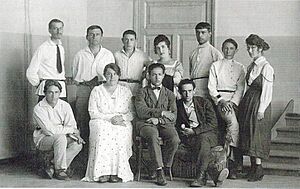
The group put their plans into action in Vitebsk. They decorated much of the city with Suprematist art. Malevich wanted them to do even bigger projects, especially in architecture. El Lissitzky, who led the architecture part of UNOVIS, worked with students like Lazar Khidekel. They drew plans for unique buildings. These included floating structures and large buildings made of steel and glass. They also designed practical things like housing and a speaker's stand for the town square.
The UNOVIS artists believed in sharing credit for their work. They signed all their art with a simple black square. This was a tribute to one of Malevich's famous paintings. The black square became the official symbol of UNOVIS. It was used instead of individual artists' names.
In June 1920, UNOVIS became even more active. They published a collection of their ideas and designs. They also took part in a big art conference in Moscow. UNOVIS students traveled from Vitebsk to Moscow. They shared their artworks, newsletters, and ideas. They also handed out copies of Malevich's writings. UNOVIS became well-known and respected as an important art movement.
End of the Group and Its Lasting Impact
Even though UNOVIS became famous, its popularity didn't last long. By 1922, the main group of artists started to split apart. Many of the artists moved to other schools or cities. They joined different art movements.
Even after UNOVIS officially ended, publications with the UNOVIS black square symbol appeared for several years. The group's influence on art continued for many generations.
Notable Members
See also
 In Spanish: UNOVIS para niños
In Spanish: UNOVIS para niños
- Soviet art
- Suprematism
- VKhUTEMAS
- Bauhaus
 | Claudette Colvin |
 | Myrlie Evers-Williams |
 | Alberta Odell Jones |


